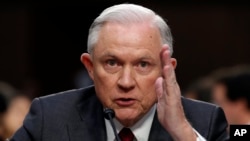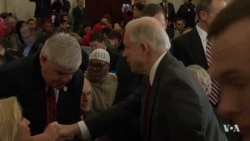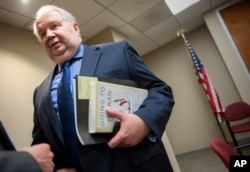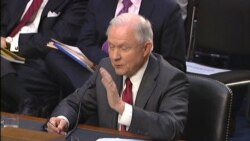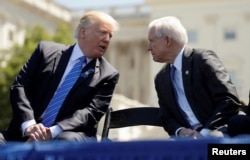Now it’s Jeff Sessions’ turn to step into the spotlight.
Less than a week after fired FBI Director James Comey delivered riveting testimony before the Senate Intelligence Committee about a series of what he described as "awkward" and "inappropriate" interactions with President Donald Trump, Sessions, the attorney general, appears before the same panel Tuesday to offer his version of events and take issue with some of Comey’s statements.
The testimony is expected to focus on the ongoing investigation into Russian interference in last year’s elections and answer questions about the role the attorney general — a Trump confidant and early supporter of his presidential bid — played in the events leading up to the May 9 firing of Comey, who was then leading the FBI’s Russia probe.
Sessions is going into the hearing with a fairly narrow agenda: to “address matters brought up” by Comey during his widely viewed testimony last Thursday.
Republican Senator James Lankford said on the CBS program Face the Nation on Sunday that “the key thing is to get his side of the story, some of the conversations Jim Comey had with the president.”
But Democrats are aiming for a broader line of inquiry that will include his meetings with the Russian ambassador to Washington during the 2016 presidential campaign and Sessions’ role in Comey's abrupt firing.
“The attorney general of the United States needs to tell the American people why he testified untruthfully about his Russian contacts, and he needs to explain all of his conversations with the Russians that have been concealed, and also why he failed to protect the FBI and why he participated in firing the FBI director when he had recused himself because of those Russian conversations,” said Democratic Senator Richard Blumenthal.
Sessions' testimony, his first since he recused himself from the Russian investigation in early March, comes five days after Comey testified that Trump had sought to pressure him into dropping an investigation of former National Security Adviser Michael Flynn, and that the attorney general had failed to respond to his concerns about private communications with Trump.
Comey later said during a closed session that the FBI leadership felt Sessions would have to recuse himself from the Russia investigation because of a suspected third undisclosed meeting with the Russian ambassador.
Last week, a Department of Justice spokesperson denied reports of a third Sessions meeting with the Russian ambassador, Sergey Kislyak.
Another spokesman said in a statement that Sessions had not remained “silent” in response to Comey’s complaint. Sessions is expected to reiterate those statements during his testimony on Tuesday.
Nevertheless, Sessions will face tough questions about his meetings with Kislyak and whether he perjured himself when he failed to disclose those contacts during his confirmations hearings in January, said Jed Shugerman, a professor of at Fordham University School of Law in New York.
"That was a problem already. The problem only gets deeper if there is in fact a third contact he did not report," Shugerman said.
Stephen Gillers, a professor of law at New York University, said proving perjury is not easy.
“Perjury requires intentionality,” he said. “For Sessions to have committed perjury, it would have to be true that he remembered the context and decided that even though revealing them would have been responsive to the questions he asked, he chose nonetheless consciously and intentionally not to do so.”
Sessions has denied the perjury allegations.
WATCH: Sessions on discussions between president, FBI director
Another key question on senators' minds: Sessions' role in Comey's firing.
The White House had initially said Trump fired Comey on the recommendations of Sessions and Deputy Attorney General Rod Rosenstein who scolded the former FBI director for his handling of the Clinton email investigation last year.
But Trump later told the NBC television network that he dismissed Comey because of the Russia investigation.
Gillers said Sessions has not answered why he played a role in Comey's firing given that he had recused himself from the Russia investigation.
"If he was recused, as he says he was, he should not have participated in the Comey firing," Gillers said.
Sessions’ decision to recuse himself from the Russia investigation had angered Trump, Politico reported last week. And as tensions grew between the two, Sessions recently offered to resign, but Trump did not accept his resignation, Politico said.
While Democrats plan to press Sessions over whether he violated the terms of his removal from the Russia probe, the recusal could nonetheless limit the scope of Sessions’ testimony.
"What can he possibly tell the Senate committee if indeed he’s done what he said he was going to do, which would include staying away from any intelligence on the ongoing investigation," Gillers said.
The testimony will be scrutinized as much for what Sessions says as what he declines to say.
Shugerman said Sessions is unlikely to invoke his Fifth Amendment right against self-incrimination in order to avoid answering certain questions.
Asked if the White House thought Sessions should invoke executive privilege to avoid answering questions about his conversations with Trump, press secretary Sean Spicer said, "It depends on the scope of the questions."
VOA Senate Correspondent Michael Bowman contributed to this article.




